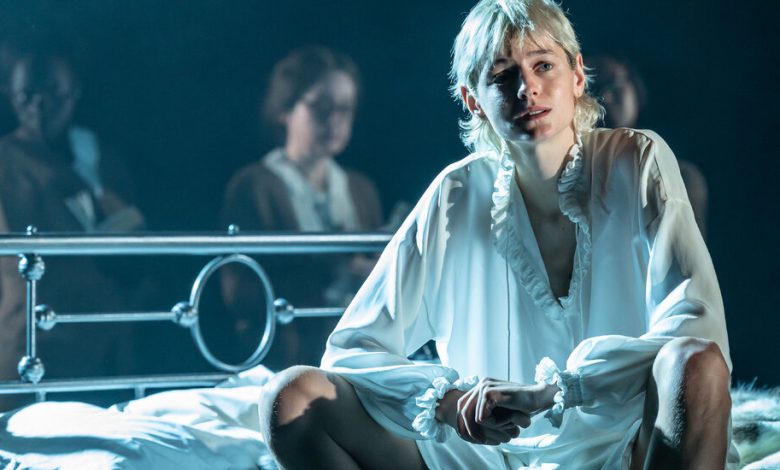Review: In ‘Orlando,’ Emma Corrin Straddles Genders and Centuries

LONDON — The play comes perfectly matched with its leading player in “Orlando,” a freewheeling take on Virginia Woolf’s gender-bending novel that opened Monday at the Garrick Theater here.
Neil Bartlett’s breezy adaptation of its 1928 source is playful, and ultimately moving, but the director Michael Grandage owes much of the production’s success to its galvanizing star, Emma Corrin, who made an acclaimed West End debut last year in the short-lived “Anna X.” Thankfully, this time, Corrin can be seen onstage for considerably longer; “Orlando” runs through Feb. 25.
The fast-rising Corrin, who identifies as nonbinary and uses they/them pronouns, has made headlines recently as much for their gender identity as for increasingly prominent screen roles. After winning a Golden Globe for playing Princess Diana in “The Crown,” Corrin starred in two films this season, “Lady Chatterley’s Lover,” and “My Policeman,” which was also directed by Grandage.
Yet none of those roles has connected as directly to Corrin’s ongoing self-inquiry as the restless, century-straddling Orlando. “Being nonbinary is an embrace of many different parts of myself, the masculine and the feminine and everything in between,” Corrin said in a recent interview with The New York Times.
Corrin has obviously spent some time with a question that Orlando asks rhetorically throughout the play: “Who am I?” We first meet the character as a young nobleman, born into Elizabethan-era luxury and a home containing 365 rooms. (The real-life inspiration for this vast property was Knole House, the countryside home of Vita Sackville-West, the author and socialite for whom an adoring Woolf wrote the novel.)
But as time hurtles forward, Orlando barely ages and awakens one day from an extended slumber, age 30, as a woman. “Well, knock me down with a flipping feather,” says Orlando’s longtime housekeeper, Mrs. Grimsditch, in response. On the other hand, this loyal sidekick has seemed comfortable with gender fluidity from the start: “Ladies and gentlemen — no, sorry, everyone” she says in an early speech to the audience. The invaluable Deborah Findlay, hair disheveled but her sense of fun unimpaired, is a delight in the role.
Corrin is more than game for whatever the play requires. This includes putting on and taking off Peter McKintosh’s ravishing costumes,to keep pace with the passing centuries.
The youthful male we glimpse at the play’s start has an impishly androgynous allure, along with a gift for rewriting Shakespeare: “Shall I compare me to a summer’s day?” a glinting Orlando asks early on. But with age comes experience and exposure, not just to royalty (Lucy Briers makes a memorably stern Elizabeth I) but also to lovers and intimates of various genders and circumstances, including a bawdy Nell Gwyn (Millicent Wong) who tells Orlando, “For a lady, you’re really quite the gentleman.”
Corrin is in full-throated voice throughout the vicissitudes of Orlando’s fraught love life — when Orlando’s heart is broken, you know it — andin moments when Orlando is taken over by fear. It’s not just that gender is fluid, we feel, but emotions are, too, and the play comes blessed with an actor who can project confidence one minute, and surrender to uncertainty the next.
The production features a bustling chorus of Woolfs, nine in all, bespectacled and drably attired; each of them adroitly handles at least one additional role, and sometimes more. (That supporting cast includes another nonbinary actor in Oliver Wickham, who plays Clorinda, an early crush for Orlando.)
The sobriety of the author on view in this version contrasts with the vivacity of her creation. We see an anxious Orlando interacting with the lineup of women: “Come on, you wrote me,” she says, almost pleadingly, as if Woolf could posthumously amend the story. And yet the play sustains a spryness of tone.
Bartlett’s adaptation is more of a sparky, affectionate pastiche, whether invoking another Woolf title, “A Room of One’s Own,” or handing a song lyric from the musical “Cabaret” — another show about shifting identity — to an especially ardent suitor, the Archduchess Harriet. (Richard Cant has particular fun with that role.)
We get a synoptic survey of changes in women’s circumstances over time — I loved the sight of the Virginias producing teacups from their bags to signal the arrival of the Victorian era — and there’s a verbal lob in the direction of Britain’s governing Conservative Party that surely owes more to Bartlett than Woolf.
But Corrin’s gorgeous performance lifts the 90 minutes, no intermission, well beyond anything resembling a history lesson or a night out requiring preparatory homework.
“I once did love,” Orlando says wistfully, and the play leaves us hopeful that this mutable, mesmerizing character will find his, or her, or their, own way to do that again.
Orlando
Through Feb. 25 at the Garrick Theater, London; thegarricktheatre.co.uk.
